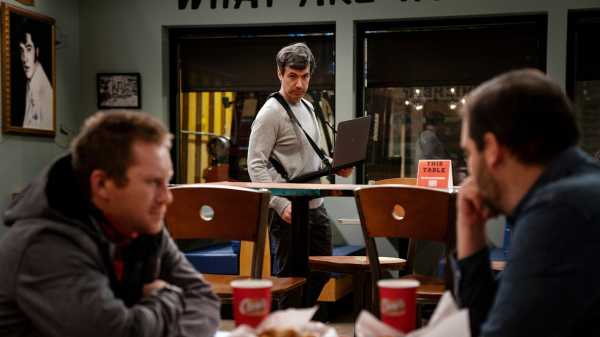
Nathan Fielder is a master of the look, or, rather, of the Look. That capital-letter stare is the visual center of Fielder’s new series, “The Rehearsal,” on HBO Max. It’s the stare in which parents hold children, teachers hold students, judges hold the accused. It's the look of mastery itself—the optical grip that makes subjects squirm. It’s the look of power. But Fielder’s subjects are volunteers, and they submit to his power in anticipation that he will do them some good. In “The Rehearsal,” Fielder’s idea is that behavior is predictable and that he himself is good at predicting it. His volunteers come to him with a problem; his plan is that, when these real people rehearse, with the help of actors, the scenarios involved in these troubles, they’ll be able to anticipate possible outcomes and thus bring about their desired one. But his idea of rehearsal is no mere verbal joust around a table. He is obsessed with the influence of physical setting on behavior, and on tiny fillips of behavior on large-scale results; he re-creates, as enormous and intricate sets, the subjects’ relevant environments.
Take the first subject, in Episode 1—a Brooklyn man of about fifty, a teacher named Kor Skeete. A longtime member of a trivia team, Kor wants to come clean about a lie: he has claimed to have a master’s degree when he has only a bachelor’s. Arriving in Kor’s apartment to plan the rehearsals, breaking the ice with small talk, Fielder—rather, let’s call his onscreen character Nathan—confesses to Kor that this very interaction was the product of Nathan’s own rehearsal. Fielder (the director, working behind the scenes) had dispatched a faux crew to Kor’s apartment to investigate a nonexistent gas leak; the crew actually photographed and mapped the apartment; a film crew built a life-size replica of Kor’s apartment in a studio; Fielder recruited an actor to play Kor, and planned the small talk down to the detail—including this confession. In Nathan’s rehearsal of this confession, the actor responds, “Wow.” To Nathan’s actual confession, Kor also responds, “Wow.” In that cut from the actor to the subject, Fielder is manifestly impressed with his own methods and his own acumen.
At that moment, barely five minutes into the first episode, I wanted to throw my laptop across the room or just to throw Nathan Fielder out of it. Not only is the gas-crew deception itself a reckless betrayal, but the gaze of superiority and dominance that he casts upon Kor struck me as arrogant, cruel, and, above all, indifferent. What I hoped for, more than anything, was for Kor to tell Nathan to get out of his apartment and his life—to cut his losses. What I craved was, at least, to hear Nathan ask Kor what that place-filler “Wow” means—to ask him for emotional specifics—and to hear Kor speak of his own feelings about being tricked. No such luck: Kor continues to play along, and Nathan shows no interest in what Kor thinks of being deceived by the man to whom (as Nathan says in voice-over) he has entrusted his life.
The show breezes by key questions, such as what Fielder—who sought his volunteers by placing a Craigslist post—promised the subjects, what was required of them, what they expected of the process, and what involvement, if any, in the ultimate broadcast product they’d have. Fielder doesn’t address these matters at all in subsequent episodes.
Deception prevails throughout. Fielder sets up a fake Web site in order to lure a woman named Tricia, to whom Kor is planning to make his confession, into the project unawares (and the deception goes far, even to a faux job for her); we never find out when she learned what she’d been roped into. When Nathan takes Kor on a skeet-shooting trip to upstate New York, he arranges for the rifles to shoot blanks; when they go swimming, Nathan arranges for a third man to interrupt a moment of mutual confession; ahead of a trivia contest, Nathan arranges an elaborate series of seemingly accidental encounters that feed the answers to the unwitting Kor. The latter, especially, Nathan recognizes as a betrayal (Kor refers to the group’s trivia contests as “sacrosanct”), and he frets about it; he shows a rehearsal of himself confessing it to an actor playing Kor and getting a bitterly angry response. As a result, Nathan never lets on whether he confessed to Kor. (The show also leaves it unclear whether he ever let Tricia know what she was being tricked into.) We have no idea how or when Kor found out about the trick, or how he took it when he did.
Classics of docu-fiction provide instructive comparisons. In Jean Rouch’s “The Human Pyramid,” from 1961, students who have improvised dramas based on their own lives also view the footage and comment on it. William Greaves’s “Symbiopsychotaxiplasm: Take One,” from 1968, features the crew filming themselves and criticizing the director—who includes that footage in the movie. Fielder’s crew members remain nonentities, mere onscreen emblems of planning and labor, even as, throughout, I wished that his cast and crew had symbio-ed him—had spoken their minds on camera about their work with him. It isn’t a matter of time but of care. By contrast, “The Rehearsal” plays like a multipart embodiment of the joke (whether Jack Handey’s or Steve Martin’s), “Before you criticize a man, walk a mile in his shoes. That way, when you do criticize him, you'll be a mile away and have his shoes.”
The second episode introduces a forty-four-year-old woman named Angela, who would like to have a child but has no man in her life, and is wondering whether she should become a single mother. To help her figure it out, Fielder plants her in a large house in a small Oregon town, fills the house with surveillance cameras, and hires child actors—from babies to teen-agers—to portray Angela’s potential child. (Fielder is more explicit about the practical complications of working with child actors—the time limits, the negotiation of parental consent—than about his main participants’ personal reactions, expectations, or involvement.) Nathan also tries to help her find a partner with whom to rear the faux-child, whom she names Adam—and, when that doesn’t work out, Nathan himself volunteers to function as Adam’s co-parent. (His participation in the fictitious family life shifts the tenor of the series without changing his approach to the subjects.) Angela presents herself as a devout Christian; she displays an obsession with the dangers of satanic cults and gives voice to some remarkable conspiracy theories regarding the power of the Devil in daily life, yet his gimlet-eyed dubiousness about these ideas remains retentive and incurious, without any probing of causes and sources and without the scathing political satire of “Borat Subsequent Moviefilm.”
The terms and conditions of Angela’s participation in “The Rehearsal”—her sense of who Fielder is and what he does and of the practices that inhere in the production—would be all the more interesting to hear, given her briefly voiced skepticism regarding mainstream-media life. They’d be even more meaningful as glimmers of her discomfort—and her own motives, even her own deceptions—turn up. Similarly, a third participant, an Oregon man named Patrick, submits himself to Fielder’s methods in order to confront his brother, the executor of their grandfather’s estate, who is denying him his inheritance. In order to put Patrick in the right mind-set, Nathan pulls an elaborate prank involving a rehearsal actor and his ostensible real life (which is actually staged); here, too, Patrick’s response to an apparent absurdity, let alone a deception, goes unvoiced. In voice-over, Nathan expresses an odd bewilderment about his power to “create feelings for other people’s rehearsals” but not for himself. It’s a bewilderment that reflects the intellectual and emotional blankness at the center of “The Rehearsal.” First, Fielder can’t prank himself; he is pulling the strings. Second, his participants—Kor, Angela, and Patrick—have come to him with problems that he’s supposed to help them solve, whereas Fielder, whatever personal problems he may be working out in the course of the series, has one overriding problem that gets in the way of them all: his very authority.
As a filmmaker, Fielder displays interest not in any physical process unfolding over time but in his own intellectual process—in the authentic ingenuity of the working out of his conceit, which the onscreen events merely exemplify, like data points rather than experiences. He revels in his own thoughts as he tailors the conditions of his subjects’ lives to fit his storytelling, largely through his own voice-over. Fielder’s main real-life stake is the one onscreen: making the show a success. The vanity and the ambition of “The Rehearsal” are its driving forces. Fielder can’t relinquish control; his obsession with details, with predicted outcomes, suggests his very failure as a filmmaker—the failure to find a dramatic form for the full range of the series’s implications and experiences. If the series is meant to be comedy, so much the worse, for making light of problems that matter to the participants—and for making even lighter of the deceptions to which he subjects them. And, if “The Rehearsal” were revealed to be not documentary at all but a mockumentary—a throughgoing fiction, pranking us all, in which no real-life subjects have volunteered—it would be only a wet squib of disingenuous self-deprecation that exhausts itself in the first minutes of the first episode. Fielder goes in to confirm results, the prime one being his own powers of mastery, of anticipation, and, above all, of entertainment. As the series goes on (tiny spoiler), Fielder amps up the complexity of his rehearsals, creating an ever-deeper spiral of preparations and impersonations. His cleverness masks the hollowness of his schemes. No digression, no incidentals, no loose ends can intrude on Fielder’s taut, compact, self-contained sketches. He looks the Look at the people he films, but doesn’t seem to see them. ♦
Sourse: newyorker.com






